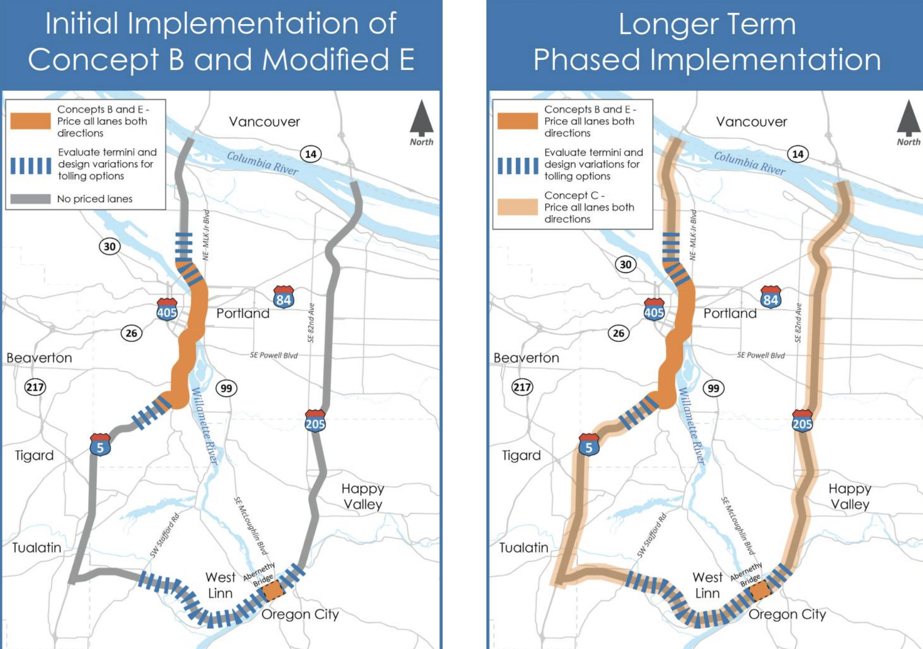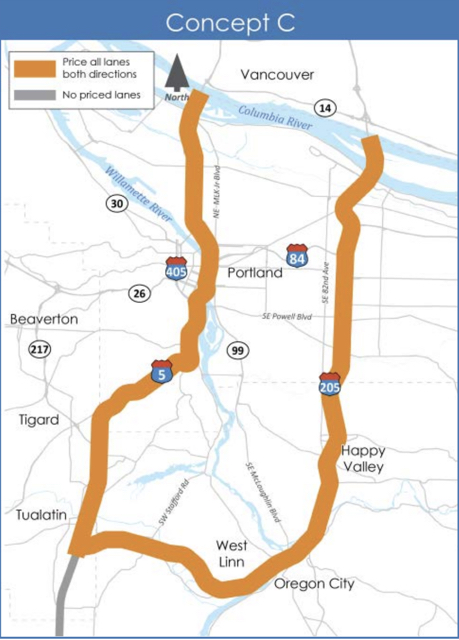
(Photo: Jonathan Maus)
It’s a rare chance to speak directly to the most powerful transportation policy-setting body in the State of Oregon on an issue that could have immense impact on our future.
In Portland this Thursday the Oregon Transportation Commission (OTC) will host a listening session on congestion pricing. The special event comes after six meetings and eight months of deliberations by the Portland Metro Area Value Pricing Feasibility Analysis Policy Advisory Committee (PAC). The 25-member PAC delivered its final tolling recommendation to the OTC on July 5th.
That recommendation (image below, PDF here) consists of an initial pilot program and a longer-term plan to be phased in later. Here’s how it would work: Tolls would be levied in two places; all lanes of I-5 between SW Multnomah Boulevard and the N Going/Alberta exit (exact termini would be decided later), and across the Abernethy Bridge on I-205 (known as concepts “B” and “Modified E”). When/if those are successful, the next step would be to toll all lanes of I-5 and I-205 from their intersection near Tualatin (south of Portland) to the Columbia River (concept C).

“Tolling of existing capacity should not be used to discourage driving,”
— Marie Dodds, AAA Oregon/Idaho
(Note that both locations for the recommended pilot program are where ODOT already has nearly $600 million in freeway widening projects planned — the I-5 Rose Quarter and Abernethy Bridge replacement projects.)
The OTC will use the PAC’s recommendation and public feedback to create a proposal for the Federal Highway Administration later this year. If the FHWA approves, they’ll allow the Oregon Department of Transportation (ODOT) to move forward with more detailed analysis and development of the program.
With the potential of pricing Oregon freeways for the first time ever, the debates over how best to do it — and more importantly, what the revenue should be used for — are just beginning to heat up.
The Street Trust, a Portland-based group that advocates for better biking, walking, and transit, is concerned about where tolling revenue will go. “As it stands it appears that ODOT intends to raise revenue for highway widening mega-projects on I-5 and I-205,” wrote PAC member and The Street Trust Advocacy Director Gerik Kransky on Twitter yesterday. “That is a dangerous policy precedent and threatens undermine the benefits of congestion pricing.”
Advertisement

The Street Trust is urging their members to testify at Thursday’s meeting. They also plan to send ODOT a petition signed by 500 people urging the agency to spend tolling revenue on projects that will making biking, walking and transit more competitive options than driving.
There’s reason for worry. While the PAC’s Charter says pricing should “encourage more efficient use of the transportation system,” and that it should help increase, “the use of other modes,” it also states that revenues should go toward, “financing freeway bottleneck relief projects.”
Not surprisingly, interest groups and agencies are lobbying the OTC in both directions.
In a letter to OTC Chair Tammy Baney, AAA, a driving advocacy group, wrote, “Tolling of existing capacity should not be used to discourage driving, change travel behavior, or generate revenue for purposes other than the necessary and beneficial improvement and maintenance of safe mobility on the tolled corridor. AAA believes that congestion pricing, when it is imposed on all road users to discourage the use of automobiles during peak traffic periods, is not an appropriate transportation policy.”
The Oregon Trucking Association only supports a pricing program if revenue is used to increase freeway capacity. “We are not in favor of congestion pricing to support other projects,” their letter states.
In his letter to the OTC, Clackamas County Commissioner (and PAC member) Paul Savas wrote that, “I find the hard line ideology of rejecting highway solutions as lacking the vision needed to serve our region.”
The City of Vancouver in Washington is already asking for an earmark, demanding that a new I-5 bridge “must be included in any discussion of bottleneck relief projects.”
Washington County is another strong voice for more freeway capacity. In their letter they encourage the OTC to, “Link tolling directly to increased freeway capacity in the region… this means targeting revenue to completing the investments in the region’s bottleneck projects in the Rose Quarter and I-205/Abernathy [sic] Bridge… It is important the people who pay the toll see benefits both in terms of better traffic flow and increased capacity.”
While The Street Trust is up against powerful voices, they are not alone. They’re signed onto letters with groups including: Verde NW, OPAL Environmental Justice, Metro, Oregon Environmental Council, TriMet, and the City of Portland. The grassroots coalition group that’s fighting the I-5 Rose Quarter project has also thrown their weight behind the idea that any money raised should not be spent on more freeway capacity.
A letter to the OTC signed by Mayor Ted Wheeler and his four city council colleagues stated they prefer Option C (toll all lanes), “because it shows greatest travel time savings and revenue generation,” and they want options B and E to be considered merely as phases to achieving it. Any revenue, they say, “must be used to ensure corridor safety and multimodal options, including transit.” And in bold type their letter adds, “Revenue from I-5 tolling should not be used to fund I-205 expansion.”
If you want your voice to be heard, sign up for a three-minute speaking slot at this Thursday’s meeting. It starts at 4:00 pm (sign-ups begin at 3:00) and will be held in the Columbia Falls Ballroom of the University Place Hotel and Conference Center at 310 SW Lincoln Street in Portland. You can also still comment online through July 20th.
— Jonathan Maus: (503) 706-8804, @jonathan_maus on Twitter and jonathan@bikeportland.org
Never miss a story. Sign-up for the daily BP Headlines email.
BikePortland needs your support.

